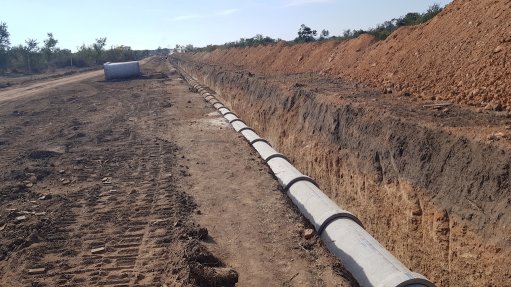
HDPE pipes supplied by Rocla
Wastewater treatment plants play a crucial role in the removal of contaminants from wastewater and sewage in order for its conversion into an effluent that can be returned to the water cycle in an environment-friendly way or reclaimed for other purposes. It is a critical process in the supply of safe water to local communities.
A project to supply 19 km of high-density polyethylene pipe (HDPE) pipes for a Polokwane wastewater treatment plant was recently completed by specialist manufacturers Rocla, which supplied HDPE vertical cast pipes for two phases of the Polokwane Wastewater Treatment Project.
“The pipes were 2.5 m Silica Rolling Joint Pipe, comprising a 3 mm sacrificial layer. Five sizes of pipe were required, namely 900 mm, 1 000 mm, 1 200 mm, 1 400 mm and 1 500 mm, which if placed end-to-end, would be over 19 km in length. The placement of each pipe required the insertion of a rubber ring and the welding of a ‘capping strip’ on the inside of each individual joint to ensure proper sealant,” explained Rocla regional sales manager Andrew Kruger.
The company asserts that its HDPE lining offers a number of advantages for water and sewer projects, including a surface smoother than concrete that allows for a smaller internal diameter piping to be utilised. The long-term pullout strength of the lining anchors is able to cope with a ground water pressure in excess of 10 m.
Concrete pipe with a cast in HDPE lining offers all the advantages of a strong rigid pipe that keeps its shape, as well as those of a plastic pipe that is impervious to acid attack. It is seen as the best pipe for large diameter gravity pipelines in almost any conditions. Standard HDPE lining is light green and 3 mm thick, with different colours and thicknesses also available.
The range of products that Rocla offers in terms of sewer reticulation are:
- Reinforced concrete pipes with a HDPE lining
- Reinforced concrete pipes with a sacrificial layer
- Reinforced concrete pipes with Xypex BIO-SAN C500: 300-mm- to 600-mm-diameter pipes
Based in the Seshego area in Polokwane, the project was subdivided into three phases and was initiated to upgrade the existing sewerage system to meet the increased requirements of local communities.